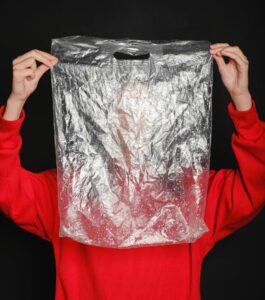 This month marked the start of the Plastic Pollution Reduction Act (PPRA), signed into law by Governor Murphy on November 4, 2020. The act, the strictest in the nation, prohibits the use or sale of single-use plastic carryout bags and polystyrene foam food service products and limits the use of single-use plastic straws. Grocery stores, specifically, are also prohibited from giving out paper bags to customers. PPRA additionally provides $500,000 from the Clean Communities Program Fund to be used for public education.
This month marked the start of the Plastic Pollution Reduction Act (PPRA), signed into law by Governor Murphy on November 4, 2020. The act, the strictest in the nation, prohibits the use or sale of single-use plastic carryout bags and polystyrene foam food service products and limits the use of single-use plastic straws. Grocery stores, specifically, are also prohibited from giving out paper bags to customers. PPRA additionally provides $500,000 from the Clean Communities Program Fund to be used for public education.
This Act is the culmination of a decade of work by dozens of lobbying groups, nonprofits, hundreds of activists, residents and a few bold elected New Jersey officials. But did you know, the movement to rid New Jersey of single-use plastic bags started right here in Princeton with a small group of passionate, determined activists? I am one of those activists.
BAG IT SETS THINGS IN MOTION
The local grassroots movement began in January 2011 when the Princeton Public Library screened the film Bag It as part of its Princeton Environmental Film Festival. The film illustrates how harmful plastic pollution is to our environment and economy. According to the EPA, between 500 billion and a trillion plastic bags are consumed worldwide each year. Each bag is used for an average of only 12 minutes!
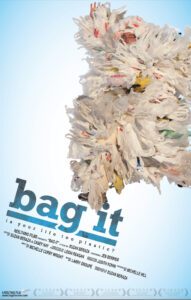 The screening of Bag It inspired several residents to work on the issue in Princeton. Sophie Glovier, a Princeton resident, engaged the local nonprofit Sustainable Princeton to help. Sustainable Princeton placed a tiny ad in one of Princeton’s local publications which invited green-minded residents to attend a meeting at Whole Earth Center, Princeton’s local organic market. I had just relocated from San Francisco and was desperate to meet some like-minded green activists. I was so excited to see the ad. At the meeting it was agreed that we would run an education campaign with Sophie as the Chairperson of the campaign. It would be called the BYOBag campaign.
The screening of Bag It inspired several residents to work on the issue in Princeton. Sophie Glovier, a Princeton resident, engaged the local nonprofit Sustainable Princeton to help. Sustainable Princeton placed a tiny ad in one of Princeton’s local publications which invited green-minded residents to attend a meeting at Whole Earth Center, Princeton’s local organic market. I had just relocated from San Francisco and was desperate to meet some like-minded green activists. I was so excited to see the ad. At the meeting it was agreed that we would run an education campaign with Sophie as the Chairperson of the campaign. It would be called the BYOBag campaign.
Our first victory came on February 28th when the Princeton Township Committee passed a resolution written by activist Daniel A. Harris. On March 8th the Princeton Borough Council followed suit. The resolutions, with no legislative power, provided that plastic pollution was an issue worth addressing and that Princeton was committed to work to address it.
THE BYOBAG CAMPAIGN
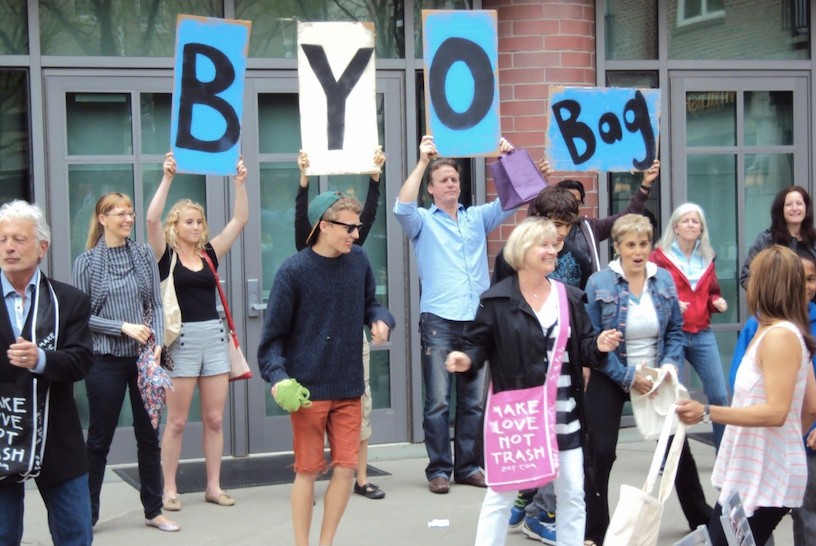 Then on April 29th, I organized a pre-launch flash mob and on June 9th, we had our kick-off party for the BYOBag campaign in Hinds Plaza. We strung up 1,000 plastic bags, and Jessica Durrie, owner of Small World Coffee, donated refreshments. Over the following months, we wrote dozens of letters to the editor and connected with like-minded activists from other towns and nonprofit groups. I canvassed 42 merchants and had them sign a pledge to help Princeton reduce the use of single-use bags.
Then on April 29th, I organized a pre-launch flash mob and on June 9th, we had our kick-off party for the BYOBag campaign in Hinds Plaza. We strung up 1,000 plastic bags, and Jessica Durrie, owner of Small World Coffee, donated refreshments. Over the following months, we wrote dozens of letters to the editor and connected with like-minded activists from other towns and nonprofit groups. I canvassed 42 merchants and had them sign a pledge to help Princeton reduce the use of single-use bags.
On October 2nd, I organized a Downtown Bike Skate Rally. The Pedestrian and Bicycle Advisory Committee participated. Princeton had just added arrows to some of its streets, so I thought it would be fun to promote safe biking and that the event would offer us exposure to a new audience. Bicyclists are often green, by nature.
A few weeks after the rally, the Environmental Education Fund (EEF), licensed the rights to show Bag It across the State. EEF is the educational non-profit arm of the New Jersey Environmental Lobby (NJEL) NJEL, a non-partisan organization with an IRS 501c4 designation, so it has no restrictions on the amount of direct lobbying that it can do on behalf of the environment.
LEGISLATIVE EFFORTS BEGIN
In December 2012, I joined other activists from around the state to testify at the Senate Environment and Energy Commission in Trenton. I advocated that New Jersey should pass a law to address the issue of plastic pollution. That is the day I met Senator Bob Smith, the Chair of the Commission and later, sponsor of the PPRA.
Senator Bob Smith is by far the greatest hero of the movement. His footprint is on almost every single piece of Environmental legislation in New Jersey. Assemblywoman Nancy Pinkin, the sponsor of the Assembly bill, also deserves recognition for her work and Senator Andrew Zwicker should also be commended for his support. He provided lectures about the harms of plastic pollution and the need to act quickly.
Noemi De La Puente, an activist from Lawrenceville and a graduate of Princeton University, testified that day as well. Noemi had been working on educating residents in Lawrenceville and around Mercer. She created many excellent tools to help the movement. Noemi deserves recognition for the work she did to make sure that the PPRA had the right definition of what a reusable bag was. We both felt the activists’ testimony was compelling and we left the meeting very excited.
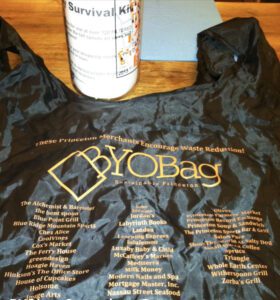 Sometime after that meeting, Sophie spearheaded a partnership with Princeton University’s Office of Sustainability and BYOBag to produce reusable bags promoting the BYOBag campaign. Each incoming freshman received a bag as part of a “Sustainability Survival Kit.” The 43 merchants that signed the BYOB pledge were listed on the bag.
Sometime after that meeting, Sophie spearheaded a partnership with Princeton University’s Office of Sustainability and BYOBag to produce reusable bags promoting the BYOBag campaign. Each incoming freshman received a bag as part of a “Sustainability Survival Kit.” The 43 merchants that signed the BYOB pledge were listed on the bag.
On April 23, 2013, NJEL presented me with a Volunteer of the Year Award for the work I had done to pass state-wide plastic pollution legislation in New Jersey. Right around that time I was starting to be invited to speak by organizations that were hosting screenings of Bag It. The Arts Council of Princeton and The Jewish Center Princeton both screened Bag It and invited me to speak. NJEL asked me if I would be willing to speak at their screenings of it, too. The President of NJEL, Anne Poole, told me that NJEL’s Board was committed to making the passage of state-wide plastic pollution legislation NJEL’s top priority.
Daniel, Dr. Stephanie Chorney and I had been producing education events and supporting “voluntary” programs for almost two years. It was apparent to all of us we needed to pass a law. Stephanie was the Chair of the Princeton Environmental Commission (PEC). Coming from San Francisco, the 1st city in the nation to address plastic pollution with legislation, I thought it would be easy to pass an ordinance in Princeton. San Francisco got rid of single-use bags in 1997. If Princeton passed an ordinance to address plastic pollution, they would be the first in NJ. When Princeton acts, the world takes notice. We hoped other NJ towns would follow Princeton’s actions, similar to what happened with the smoking ban. If enough towns pass ordinances, the state would be forced to act.
PUSHING THE PRINCETON ORDINANCE
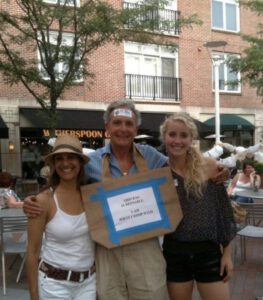 I approached Daniel to see if he wanted to co-author a draft ordinance for Princeton. I believe our draft ordinance was the first one written in the State of New Jersey. Our original ordinance followed San Francisco’s approach and banned the bags.
I approached Daniel to see if he wanted to co-author a draft ordinance for Princeton. I believe our draft ordinance was the first one written in the State of New Jersey. Our original ordinance followed San Francisco’s approach and banned the bags.
With our draft completed we presented our ordinance to PEC and made our case. The PEC agreed to support an ordinance. Stephanie authored a memo to Mayor and Council outlining many actions the town could take to address waste issues. Stephanie, Daniel, and Diane Landis, the Executive Director of Sustainable Princeton, and myself met with Mayor Lempert. The Mayor said she could not support an ordinance at that time, nor would she put the issue on the agenda to start a working group. A few days after our meeting with Mayor Lempert, Diane notified the other activists that Sustainable Princeton could not support an ordinance. Their position was that voluntary programs were the better approach.
Voluntary programs make people feel good, but they don’t have much impact. Things seemed dire. The “greenest” Mayor in New Jersey had just refused to support an ordinance. And now Sustainable Princeton, our local green organization was also refusing to support it. If we couldn’t get our elected officials to support passing legislation in our own backyard, would we have any success convincing other Environmental Commissions and Mayors to support passing an ordinance?
We decided we should start lobbying merchants to support us. Our first meeting was with our local grocery store, McCaffrey’s, which had been very supportive of our education and voluntary programs. Unfortunately, Mr. McCaffrey refused to support an ordinance citing that if Princeton charged $0.10 a bag, customers would drive to Montgomery to grocery shop. A few days after our meeting, I received a letter by mail from Mr. McCaffery and the NJ Food Council (the grocery store lobby). The Council was the most vocal opponent of plastic pollution legislation and their letter notified us that they would do whatever it took to make sure that Princeton would not pass an ordinance. We continued to lobby other merchants and find more supporters.
After several months, maybe a year, we went back to Mayor Lempert to lobby her again to support an ordinance. She insisted, before considering an ordinance, McCaffrey’s had to agree to support it and we needed to convince all the other towns in Mercer County to agree to pass one, too. Her reasoning was that if we passed an ordinance in Princeton versus county-wide, merchants like McCaffrey’s, who operated in multiple towns in Mercer County, would be subject to different laws. It would be confusing to merchants.
But, Stephanie, Daniel and I continued to lobby Princeton’s Council members, hold events, and write letters to the editor. I kept speaking at screenings of Bag It. We started to do outreach to connect with the activists around Mercer County. Then surprisingly, County Executive Brian Hughes reached out to us and other activists around Mercer County and convened a Mercer County work group. We quickly lobbied our group to make plastic pollution our first issue.
COUNTY GETS INVOLVED
On August 11, 2014, Hughes shared that he was requesting county commissioners to support placing a nonbinding referendum on the November ballot to get the public’s take on charging residents a $0.05 fee for each single-use plastic shopping bag they used. Any actual fee would have to come in the form of state legislation.
On August 13th, Noemi testified in front of the county commissioners. Four commissioners agreed to place the referendum on the ballot. Commissioner Andrew Koontz, a Princeton resident, was one of the four.
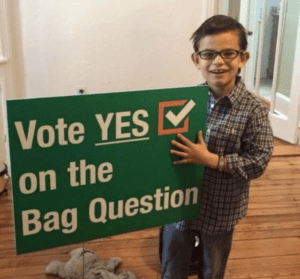 The Watershed Institute organized a meeting to bring the new Mercer County group and other environmental groups and nonprofits together under one roof to strategize how we could get voters to approve the referendum across the County.
The Watershed Institute organized a meeting to bring the new Mercer County group and other environmental groups and nonprofits together under one roof to strategize how we could get voters to approve the referendum across the County.
On October 18, 2014, I organized an event in Hinds Plaza sponsored by NJEL and EEF called Soapbox Saturday. The event was designed to provide an open public forum in which to discuss the county referendum on single-use bags. It was attended by many residents and officials, including Mayor Lempert, Councilwoman Heather Howard, PEC Chair Matt Wasserman, Stephanie and Diane.
Despite the efforts, the ballot question was defeated by a margin of 61% to 39%. The referendum didn’t pass in any town except Princeton. It was a bittersweet victory. Surely Mayor Lempert would support the ordinance now?
The votes clearly showed that the majority of Princeton voters supported addressing plastic pollution with legislation that would render a fee. We arranged to meet with Mayor Lempert. This time her position was that passing an ordinance with a fee was unconstitutional. She was concerned the town might get sued. She engaged an Attorney who wrote a lengthy memo advising Princeton not to pass an ordinance.
I crossed paths with Jennie Romer, the woman that wrote the New York City plastic pollution ordinance which charged a fee and merchants kept it. Her strategy was brilliant. I revised our draft ordinance with the fee going to merchants. Now we had good news to share with our local merchants, too. And Mayor Lempert’s concerns about the fee being a tax we’re resolved.
I arranged a meeting with Jack Morrison, the owner of JM Group (Blue Point Grill, Witherspoon Grill, Kristine’s). Morrison said he would not support an ordinance. At that time, he was the head of the Princeton Merchants Association (PMA). Then we met with other PMA leaders as well as several PMA merchants, and were later advised PMA would not support the ordinance. It was hard not to be disappointed, but we just kept doing the work. After a few months, Councilwomen Jenny Crumiller and Heather Howard agreed to support an ordinance publicly! We had two votes, two down and two to go. After four years of work there was some light at the end of the tunnel.
On February 13, 2015, Stephanie and I were both interviewed for a TV news report on Princeton activism. The story was picked up by other news outlets and a radio show.
STATE GETS TRACTION
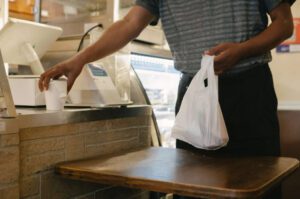 The movement was gaining traction. On November 3rd Stephanie and I met with Dini Checko from the Association of New Jersey Environmental Commissions (ANJEC). We shared all the research and tools we had both created over the years. Noemi shared hers as well. We were all thrilled to have ANJEC’s support. ANJEC, a 501c3 organization, advocates powerfully for environmental policy. The Executive Director, Jennifer Coffey, Alex Ambrose and Dini worked very hard to help pass the PPRA. Recognition and a huge thanks should also be given to residents like Eve Coulson, who helped to support this issue locally and to the following organizations: New Jersey Environmental Lobby and its President Anne Poole, Environmental Education Fund and its Executive Director Lindsey Kayman, Clean Water Action and its Executive Director Amy Goldsmith, the NJ League of Conservation Voters, its Executive Director Edward Potosnak and Environmental Policy Associate Rebecca Hilbert, the Watershed Institute, and Mike Pisauro, the Coalition of the Delaware Watershed Sandra Meola Bodner the previous Executive Director and Kelly Knutson the current Director, and the Sierra Club and its previous Executive Director Jeff Tittle. There are hundreds of organizations that helped. These are the main ones that I know that lobbied on plastic pollution issue. The passage of PPRA was truly a collaborative endeavor.
The movement was gaining traction. On November 3rd Stephanie and I met with Dini Checko from the Association of New Jersey Environmental Commissions (ANJEC). We shared all the research and tools we had both created over the years. Noemi shared hers as well. We were all thrilled to have ANJEC’s support. ANJEC, a 501c3 organization, advocates powerfully for environmental policy. The Executive Director, Jennifer Coffey, Alex Ambrose and Dini worked very hard to help pass the PPRA. Recognition and a huge thanks should also be given to residents like Eve Coulson, who helped to support this issue locally and to the following organizations: New Jersey Environmental Lobby and its President Anne Poole, Environmental Education Fund and its Executive Director Lindsey Kayman, Clean Water Action and its Executive Director Amy Goldsmith, the NJ League of Conservation Voters, its Executive Director Edward Potosnak and Environmental Policy Associate Rebecca Hilbert, the Watershed Institute, and Mike Pisauro, the Coalition of the Delaware Watershed Sandra Meola Bodner the previous Executive Director and Kelly Knutson the current Director, and the Sierra Club and its previous Executive Director Jeff Tittle. There are hundreds of organizations that helped. These are the main ones that I know that lobbied on plastic pollution issue. The passage of PPRA was truly a collaborative endeavor.
On November 21st, Longport became the first town in New Jersey to impose a fee for plastic bags at its local businesses.
In 2018 the State of New Jersey passed a state-wide plastic pollution bill. Governor Murphy vetoed the bill. He criticized, among other aspects, the fact that only certain businesses would be targeted. Environmental activists were split on his actions.
Fast forward to 2019, and 130 New Jersey towns had passed some form of legislation that restricted plastic bags, straws, polystyrene food containers and balloons. Several of the Mercer County towns that had not supported the referendum in 2015 passed ordinances: Trenton, Hopewell Township, and Pennington. In November 2019, I was invited to West Windsor’s Council meeting by activist and Attorney Tirza Wahrman. Tirza and a group of very passionate residents had been working for years to pass an ordinance. West Windsor did pass an ordinance, it was later vetoed by Mayor Hermant Marathe.
Daniel passed away on January 20, 2020, and Stephanie was diagnosed with cancer. She felt like all the work she did was for nothing. In January 2019 I decided to dedicate all my time to working on environmental issues. I assumed the role of Executive Director at the NJEL. One of my goals was to make sure that my “partner in green crime”, as she liked to call herself, would see an ordinance pass. I began lobbying and meeting with Council members more aggressively. Sophie Glovier, then PEC Chair, presented the case to Mayor and Council that Princeton should pass an ordinance, yet Princeton never passed one.
Stephanie did not live to see Governor Murphy sign the PPRA. On September 22, 2020, two weeks before she passed away, the bill (S864/A1978) passed at the State level! She died knowing her work was not in vain.
Most great movements start out as grassroots movements. Ordinary residents can change the world if they are committed. To be successful in passing legislation you need bold, elected officials that will support you. You need to “do the work,” believe in yourself and commit to never, ever give up. When the climate crisis hits it will be the poor, elderly, and disabled that will suffer the most. My son, Kai, is severely autistic. I’ll be dead by then. For me it’s not just critical that we act, it’s critical that we act now. It took a decade, but New Jersey now has the strictest plastic pollution reduction act in the nation. As I always say, “Change your behavior, change the world.”

Bainy Suri, Esq. is the Executive Director of the New Jersey Environmental Lobby (NJEL) and prior to that was the Manager of Volunteer Services for Capital Health. Her career spans such industries as fashion, entertainment law, and legal publishing, where she worked in business development with Bloomberg BNA for 11 years. Bainy started her own consulting business in 2013 to allow her to pursue her passion to work in healthcare, environmental protection and community engagement. She holds a J.D. from the Fordham University School of Law, studied at The London School of Economics and received her B.A. in Economics from Simmons College in Boston. She has served the NJ/Princeton communities in many capacities, including as a member of the NJ Association of Volunteer Resource Professionals, on Princeton’s Zoning Board, the Boards of the NJ Environmental Lobby and Meals on Wheels of Mercer County, the Princeton Environmental Film Festival Committee, The Arts Council of Princeton Circle of Friends and is founder of the Princeton Community Collective.

 Ingredients:
Ingredients: Ingredients (4-5 servings)
Ingredients (4-5 servings)
 Ingredients:
Ingredients:
